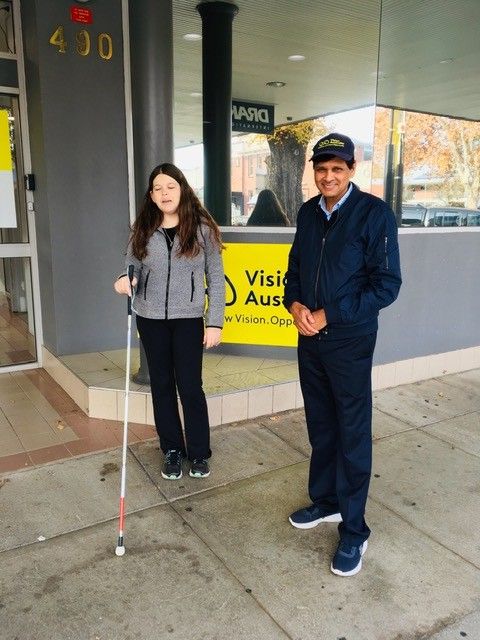A day in the life of an orientation and mobility specialist can be varied – from helping someone learn their route to work to using innovative app technology - but no matter what the task, it’s always to support people who are blind or have low vision navigate the world safely and independently.
Maruthi is a Vision Australia orientation and mobility specialist based in Albury New South Wales and explained while everyone is different but they all have goals they want to achieve.
“I set a plan to help them achieve those goal step by step and block by block,” he said.
“A lot of people I work with find it hard to figure out how far away a building might be or how high a step might be.
“It might seem like simple things but teaching strategies for how to overcome these problems, can be really helpful in someone navigating the world safely and independently.”
The O&M toolbox
Maruthi’s toolbox of strategies includes cane techniques, strategies for preventing falls and training for people wanting to move around independently both inside and outside of their homes.
“A long cane gives people who are blind or have low vision an idea of how close an object or building is or how high a step or gutter is.
“It means that they can safely interact with their environment.”
“I also help people to move around their homes by trailing along the walls and by using landmarks and I train people to use a cane as a primary mobility aid when they’re traveling outside their homes.
“We also use apps like Microsoft Soundscape and BlindSquare as secondary aids.”

Step by step
Maruthi said people often want to learn particular routes including getting to local shops and cafes but some clients may feel anxious about traveling independently.
“I tend to start with little steps.
“A client might start off learning to get from home to the local shops, then from home to the doctors, then from home to the mall.
“With little steps we achieve big goals.”
Having trained in New Zealand under the direction of Professor Steven J. LaGrow, Maruthi is a triple threat as he is also a qualified access technology specialist and has taught braille and daily living skills.
“My other qualifications have helped me to provide a better orientation and mobility service to my clients,” he said.
“For example, I might visit someone at their home and they might tell me about the problems they’re having with finding things in their kitchen.
“I am able to provide suggestions and solutions including organising cupboards or marking kitchen items with braille labels.”
Telehealth during COVID-19
In order to help clients and staff stay safe during the COVID-19 pandemic, Vision Australia has increased the use of telehealth services.
Staff can work with clients over the phone or over the internet instead of face to face.
For Maruthi, working in regional NSW, telehealth isn’t new.
“When I came to Albury there was quite a bit of travel involved and sometimes I travelled two or three hours one way just to provide a two-hour service.
“I started providing my service via telehealth years ago, talking to people over the phone or over WhatsApp and then I started talking to people over Zoom.
“I’m really glad I got the experience using telehealth because it really prepared me for the challenges of Covid-19.”
Love what you do
Maruthi gets a lot of joy out of what he does.
“I’m really lucky to have the skills I need to help people who are blind or have low vision,” he said.
“I feel humbled that clients are allowing me into their lives.
It is a privilege for me.”
For more information about Vision Australia’s orientation and mobility services, call 1300 847 466 or email [email protected]










